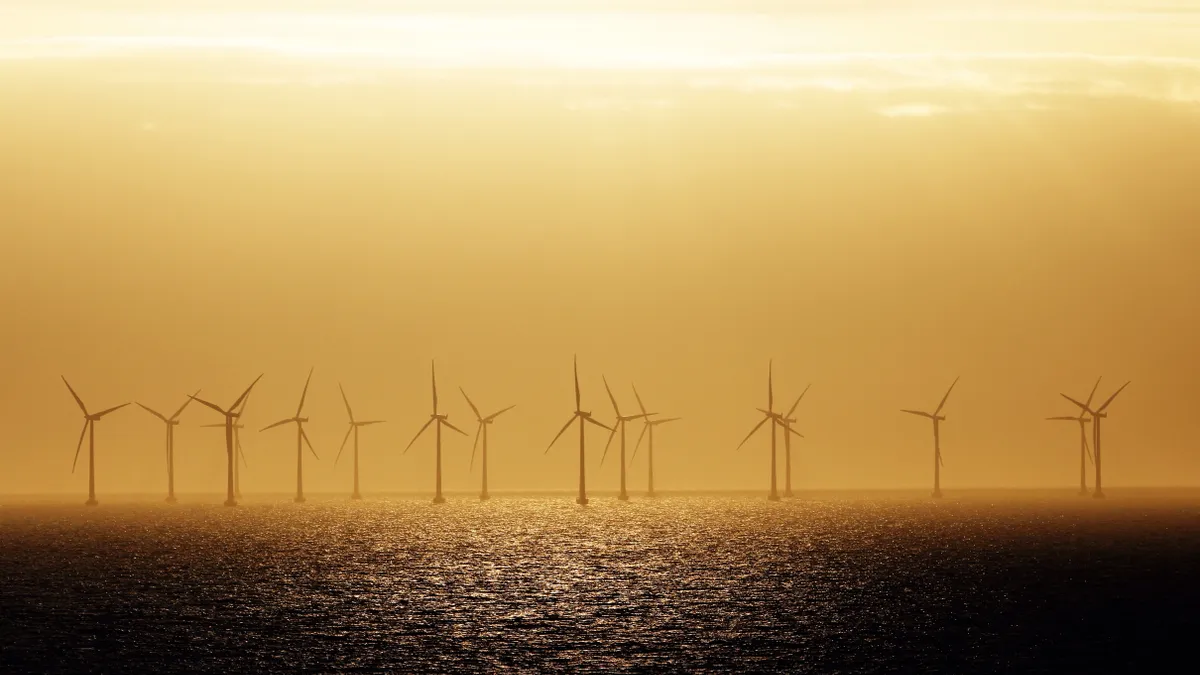Dive Brief:
- Skipjack Offshore Energy's 120 MW wind farm will be delayed for more than a year due to holdups with federal permitting.
- A lawyer for the developers wrote the Maryland Public Service Commission on Tuesday to report a revision in the project's estimated commercial operation date from November 2022 to the end of 2023. Spokespersons from Skipjack's parent company, Ørsted, linked the revision to a delayed federal Notice of Intent for the project.
- U.S. offshore wind advocates expect more project delays now that the Department of Interior's Bureau of Ocean Energy Management (BOEM) has pushed back the release of its final Environmental Impact Statement for Vineyard Wind, a project off the coast of Massachusetts, by 1.5 years.
Dive Insight:
BOEM considers applications as they come in and progress on the Skipjack application is therefore queued behind Vineyard Wind, Liz Burdock, president of the Business Network for Offshore Wind told Utility Dive. She said the Network and others in the offshore wind industry have asked BOEM to let Skipjack jump ahead and decouple projects in different offshore leasing areas from its review of Vineyard Wind.
BOEM is currently reviewing the Construction and Operations Plan (COP) for Skipjack and a handful of other projects planned for Atlantic. After completing the COP review, the agency would issue a Notice of Intent to prepare an Environmental Impact Statement.
"At this time, we don't have an anticipated date for completing [the Skipjack COP] review," a BOEM spokesperson told Utility Dive.
The notice sent to the Maryland PSC about the project doesn't state a reason for a date revision. "Skipjack remains committed to developing, constructing, and operating the Project to enable Maryland both to achieve its renewable energy goals and to benefit from the in-State economic activity associated with the Project," Christopher Gunderson, attorney with the Baltimore firm Venable, wrote in the letter.
However, the developer has been clear in a subsequent statement about the timeline revision.
"As the federal permitting timeline evolves, Ørsted is now receiving its federal Notice of Intent for the Skipjack Wind Farm later than originally anticipated," Gabriel Martinez, company spokesperson, told Utility Dive.
Project delays can sometimes be due to technical reasons, but that's apparently not the case with Skipjack.
PSC staff filed testimony on Friday about the project's switch from 8 MW to 12 MW wind turbines, which concluded among other things that "the turbine selection does not impact the scheduled commercial operations date."
Burdock also confirmed, from Ørsted's conversations with the Network, that the delay was not due to technology. However, the one-year delay will give developers an opportunity to figure out how to bring suppliers together "in the new normal" as expectations for social distancing evolve, she said.
"From my understanding, and talking to them, [the delay] does have to do with the BOEM process and some impacts from COVID," she said.
Ørsted did not respond to questions about the role of COVID-19 on project delays, which will be based off the coast of Delaware in the Delmarva region.
But project permitting work for offshore wind in general could encounter some hurdles during the novel coronavirus pandemic. For example, some leasing areas require impact studies of marine life that only comes into the region in the spring. According to the American Wind Energy Association, a developer that needs a permit regarding wildlife in the springtime could be delayed for a year, to conduct such studies the following spring if current pandemic-related work restrictions delay activities.
The vast majority of BOEM's workforce is on telework status and the agency continues to accept and process COPs as offshore wind developers submit them, according to a BOEM spokesperson.
BOEM has adjusted very efficiently to remote work, according to Burdock. "BOEM has said that they are figuring out how to use virtual tools to engage with stakeholders."















